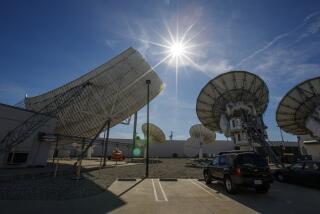Pepsi Gladly Subs for Coke as the Edison Field Cola
- Share via
ANAHEIM — Breaking an exclusive 43-year partnership with the Walt Disney Co., Coca-Cola Co. walked away from a new contract as the sole soft-drink supplier at Edison International Field of Anaheim for the upcoming baseball season.
Instead, Disney said Tuesday, it has signed a 10-year agreement with Pepsi-Cola Co. Financial terms weren’t disclosed.
Coke had the right to match Pepsi’s Edison Field offer, but decided the price was too high, opening the door for Pepsi to the Disney kingdom.
“The money that the Angels wanted we felt was above the value” it would provide, said Coca-Cola spokesman Scott Jacobson. “We think it is better spent at Disneyland, where young consumers--our consumers--spend their time.”
Since the opening of Disneyland in 1955, Atlanta-based Coke has been the sole soft-drink supplier to Disney’s theme parks. Coke also holds the soft-drink contract at Mighty Ducks professional hockey games at the Arrowhead Pond of Anaheim.
At Disneyland, Coke is the corporate sponsor of the new Moonliner attraction, which is opening at a renovated Tomorrowland later this year.
For Disney, the deal with Pepsi allows the Angels to extend their reach into the community, said Bob Wagner, director of advertising and broadcast sales at Anaheim Sports, the Disney subsidiary that controls the Angels and owns the Mighty Ducks.
“They’ve been very aggressive in implementing a grass-roots program with Little League that involves, coupons, banners and discounts,” Wagner said.
Pepsi touted its break on the lock Coke had with Disney as a major victory in its ongoing battle against the world’s largest soft-drink maker.
“People are going to identify Pepsi with the fun they have at the ballpark and that drives the trademark equity far outside the confines of Edison Field,” said Pepsi spokesman Jeff Brown.
But Coke won the war long ago, and added to its substantial lead last year. In the United States, Coke upped its market share advantage by 2%, to 43.9%, according to Beverage Digest, an industry newsletter. Pepsi, meanwhile, saw its market share fall 0.3%, to 30.9%.
For Pepsi, the deal with Disney boosts its presence at major Southern California sports and entertainment venues. The company has soft-drink contracts with hockey’s Kings and basketball’s Lakers at the Great Western Forum and with Universal Studios and the California Motor Speedway in Ontario.
In baseball, Coke still has the dominant share of the business. It is the sole soft-drink source for 22 of the league’s 30 teams.
But Pepsi continues to chip away at Coke’s presence. Pepsi has contracts with the New York Mets, Chicago Cubs, Seattle Mariners, Cleveland Indians, Kansas City Royals and the two expansion teams that begin play this season, the Tampa Bay Devil Rays and the Arizona Diamondbacks.
Last year, it signed a five-year deal to be the national sponsor of the national pastime, which allowed it to build promotions around the All-Star balloting by fans.
In succeeding Coke at Edison Field, Pepsi is taking on an account that its chief competitor found expendable. But Pepsi will gladly take any business Coke wants to surrender, Brown said.
“We don’t measure the success of this contract strictly by the volume of Pepsi sold,” Brown said. “We plan to do all sorts of things with promotions on cans, ticket giveaways and community involvement programs.”
He declined to provide details, saying they are still being negotiated with Disney.
The deal announced Tuesday allows Pepsi to sell its flagship cola at Edison Field along with Diet Pepsi, Mountain Dew and Slice soft drinks. The Purchase, N.Y., beverage giant also gets signage at Edison Field and the Angels’ spring-training facility in Tempe, Ariz.
Pepsi has been more aggressively going after Coke strongholds since spinning off its restaurant operations--KFC, Pizza Hut and Irvine-based Taco Bell--last year.
The company is targeting the so-called fountain business, which is vastly more profitable than the canned and bottled drinks sold in stores, said Doug Christopher, an analyst at Crowell, Weedon & Co. in Los Angeles. Last year, Pepsi’s fountain business, which includes sales at restaurants, accounted for 20% of its $20.9 billion in sales.
More to Read
Inside the business of entertainment
The Wide Shot brings you news, analysis and insights on everything from streaming wars to production — and what it all means for the future.
You may occasionally receive promotional content from the Los Angeles Times.










